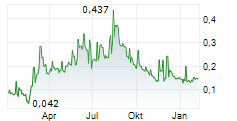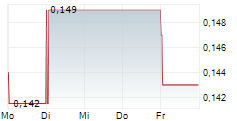
STOCKHOLM, SE / ACCESS Newswire / April 2, 2025 / AlzeCure Pharma (STO:ALZCUR)(FRA:AC6) - AlzeCure Pharma AB (publ) (FN STO:ALZCUR), a pharmaceutical company that develops candidate drugs for diseases affecting the nervous system, focusing on Alzheimer's disease and pain, announced today that an article has been published in Nature suggesting the use of NeuroRestore ACD856 in the treatment of obesity.
The article, entitled Missense variants in FRS3 affect body mass index in populations of diverse ancestries , was published in the prestigous journal Nature by Andrea Jonsdottir & Kari Stefansson et al. The authors found FRS3 to be a convincing downstream component of the BDNF-TrkB pathway, which could potentially be targeted for obesity treatment. The authors also reference NeuroRestore ACD856 several times, e.g.:
"The recent synthesis of an intracellular positive modulator of central Trk-signaling presents an opportunity for targeting TrkB or its downstream proteins, including FRS3."
"This molecule therefore raises the prospect of targeting the BDNF-TrkB pathway in treatment of obesity."
Indeed, BDNF is believed to play an essential role in maintaining a healthy weight by suppressing appetite, enhancing metabolism, and preventing excessive fat storage. Low BDNF levels are associated with obesity and metabolic disorders, while increasing BDNF may help regulate body weight. Human genetics related to the BDNF gene (e.g. Val66Met polymorphism) are also linked to a higher risk of obesity.
Another article, also published in Nature and entitled Brainstem BDNF neurons are downstream of GFRAL/GLP1R signalling by Claire Feetham & Simon Luckman et al., show that BDNF neurons are required for the weight-reducing actions of GLP1 receptor agonists. This would indicate that the use of a compound such as NeuroRestore ACD856, which enhances BDNF/TrkB signaling might provide a route for longer-term weight loss and could be used as a standalone treatment or in combination with GLP1 receptor agonists such as Wegovy and Zepbound to synergistically enhance its effects even further.
"These are new and highly interesting results that implicate the use of NeuroRestore ACD856 for use in the treatment of obesity. Of special interest is the potential use of it in combination with GLP1 agonists to further enhance the weight-reducing effects. Indeed, previous studies with ACD856 have shown effects in obese animals e.g. increased insulin sensitivity. We are monitoring this area with great interest, including with regard to clinical trials", said Martin Jönsson, CEO at AlzeCure Pharma AB.
References:
Jonsdottir AB et al. Missense variants in FRS3 affect body mass index in populations of diverse ancestries. Nat Commun. 2025 Mar 25;16(1):2694.
https://www.nature.com/articles/s41467-025-57753-2
Feetham CH et al. Brainstem BDNF neurons are downstream of GFRAL/GLP1R signalling. Nat Commun. 2024 Dec 30;15(1):10749.
https://www.nature.com/articles/s41467-024-54367-y
For more information, please contact
Martin Jönsson, CEO
Tel: +46 707 86 94 43
martin.jonsson@alzecurepharma.com
About AlzeCure Pharma AB (publ)
AlzeCure ® is a Swedish pharmaceutical company that develops new innovative drug therapies for the treatment of severe diseases and conditions that affect the central nervous system, such as Alzheimer's disease and pain - indications for which currently available treatment is very limited. The company is listed on Nasdaq First North Premier Growth Market and is developing several parallel drug candidates based on three research platforms: NeuroRestore ® , Alzstatin ® and Painless.
NeuroRestore consists of two symptomatic drug candidates where the unique mechanism of action allows for multiple indications, including Alzheimer's disease, as well as cognitive disorders associated with traumatic brain injury, sleep apnea and Parkinson's disease and is being prepared for phase 2. The Alzstatin platform focuses on developing disease-modifying and preventive drug candidates for early treatment of Alzheimer's disease. Painless is the company's research platform in the field of pain and contains two projects: ACD440, which is a drug candidate in the clinical development phase for the treatment of neuropathic pain with positive phase 2 results, and TrkA-NAM, which targets severe pain in conditions such as osteoarthritis. AlzeCure aims to pursue its own projects through preclinical research and development through an early clinical phase, and is continually working on business development to find suitable outlicensing solutions with other pharmaceutical companies.
FNCA Sweden AB is the company's Certified Adviser. For more information, please visit www.alzecurepharma.se .
About NeuroRestore
NeuroRestore is a platform of symptom-relieving drug candidates for disease states in which cognitive ability is impaired, e.g. Alzheimer's Disease, sleep apnea, traumatic brain injury and Parkinson's disease. NeuroRestore stimulates several important signaling pathways in the brain, which among other things leads to improved cognition. Preclinical studies with NeuroRestore have shown that AlzeCure's drug candidates enhance communication between the nerve cells and improve cognitive ability. The NeuroRestore substances are so called Trk-PAMs which stimulate specific signaling pathways in the central nervous system known as neurotrophins, the most well-known being NGF (Nerve Growth Factor) and BDNF (Brain Derived Neurotrophic Factor). The levels of NGF and BDNF are disturbed in several disease states and the signaling is reduced. The impaired function impairs communication between the synapses, i.e. the contact surfaces of the nerve endings, as well as reducing the possibility of survival for the nerve cells, which gives rise to the cognitive impairments. Neurotrophins play a crucial role for the function of nerve cells, and a disturbed function of BDNF has a strong genetic link to impaired cognitive ability in several different diseases, such as Alzheimer's, Parkinson's disease, traumatic brain injury and sleep disorders. There is also a link between BDNF signaling and depression, something that has been further strengthened in recent years. In addition to cognitive-enhancing effects, new preclinical data also show that NeuroRestore substances have a positive effect on mitochondrial function and display neuroprotective as well as anti-inflammatory effects, which could indicate potential disease-modifying effects. The leading drug candidate in the platform, ACD856, has recently completed clinical phase I studies and demonstrated positive effects there that support continued development of the program and are being prepared for phase 2. Read more at: https://www.alzecurepharma.se/en/neurorestore/
About Alzheimer's disease
Alzheimer's disease is the most common form of dementia, affecting approximately 55 million people worldwide, and the number is estimated to triple in the next 30 years if nothing is done. Alzheimer's disease is a lethal disorder that also has a large impact on both relatives and the society. Today, preventive and disease modifying treatments are missing. The main risk factors to develop Alzheimer's are age and genetic causes. Even though the disease can start as early as between 40 and 65 years of age, it is most common after 65 years. Significant investments in Alzheimer research are being made because of the significant unmet medical need and the large cost of this disease for healthcare and society. The total global costs for dementia related diseases are estimated to about 1,300 billion USD globally in 2019. Given the lack of both effective symptomatic treatments and disease modifying treatments, including preventive treaments, the need for new effective therapies is acute. The few approved drugs on the European market today have only a limited symptomatic effect and can produce dose limiting side effects. A disease modifying treatment for Alzheimer's disease is estimated to reach more than $15 billion in annual sales. In Sweden, approximately 100,000 people suffer from Alzheimer's disease with a healthcare cost of about SEK 63 billion yearly, which is more than for cancer and cardiovascular diseases combined.
Image Attachments
Martin Jönsson CEO AlzeCure Pharma
Attachments
New scientific article in Nature linking the potential use of NeuroRestore ACD856 for the treament of obesity
SOURCE: AlzeCure Pharma
View the original press release on ACCESS Newswire



